As Denver’s climate continues to challenge our lawns and gardens, more and more homeowners are turning to homemade weed killer solutions as safer, more sustainable alternatives to commercial herbicides.
Commercial herbicides may also persist in our clay-heavy Denver soils longer than desired, affecting future plantings and potentially harming beneficial soil microorganisms that our gardens need to thrive in our challenging climate.
This comprehensive guide explores effective homemade weed killer recipes using common household ingredients, application techniques, safety considerations for family and pets, and long-term weed management strategies that work with Colorado’s distinct seasonal cycles.
How Homemade Weed Killers Work (The Science Behind It)
Before mixing up your own homemade weed killer, it’s important to understand the science behind how these natural solutions work.
Unlike many commercial herbicides that use synthetic chemicals to disrupt plant growth at the cellular level, most homemade solutions work through simpler, physical mechanisms:
- Desiccation: Ingredients like vinegar (acetic acid) and salt draw moisture out of plant tissues, causing them to dry out and die.
- Disruption: Soap breaks down the protective waxy coating (cuticle) on leaves, allowing other ingredients like vinegar to penetrate more effectively and accelerating the dehydration process.
- Osmotic Stress: Salt creates a hostile soil environment by preventing water uptake in roots through osmotic pressure, essentially starving the plant of necessary moisture and nutrients.
Best Homemade Weed Killer Recipes (That Actually Work)
Based on our extensive testing in Denver’s unique climate conditions, these homemade weed killer recipes have proven most effective against common Colorado weeds. Each recipe uses readily available household ingredients and can be prepared in minutes.
Classic Vinegar + Salt + Dish Soap Mix (Most Popular & Potent)
Ingredients:
- 1 gallon white vinegar (5% or 10% acetic acid)
- 1 cup table salt or Epsom salt
- 1 tbsp dish soap (like Dawn)
Instructions:
- Combine all ingredients in a large container
- Mix thoroughly until salt dissolves completely
- Transfer to a spray bottle or garden sprayer
- Apply directly to weeds on a sunny, dry day
Best for: Driveways, sidewalk cracks, gravel areas, and other non-garden spaces. This solution works particularly well on Denver’s stubborn bindweed and thistle populations.
Why it works: The vinegar burns weed foliage on contact, salt prevents root water uptake, and soap helps the solution stick to and penetrate the waxy leaf surface. In Denver’s intense sun, you’ll often see results within hours.
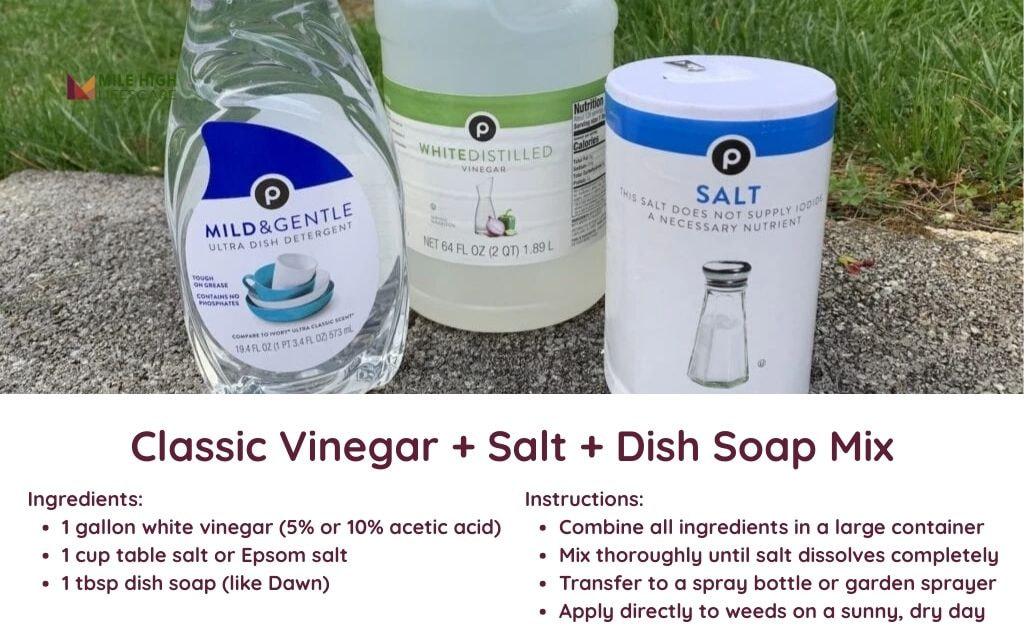
Vinegar + Lemon Juice Weed Spray (Acidic & Biodegradable)
Ingredients:
- 2 cups white vinegar
- ½ cup lemon juice
- 1 tbsp liquid soap
Instructions:
- Mix all ingredients in a spray bottle
- Shake well before each use
- Spray directly onto weed leaves until thoroughly coated
Best for: Garden beds with smaller, shallow-rooted weeds. This gentler formula is less likely to harm soil biology in Denver’s already challenged soil ecosystem.
Why it works: The combination of acids from vinegar and citrus creates a potent solution that breaks down plant cell walls while being more environmentally friendly than salt-based options.
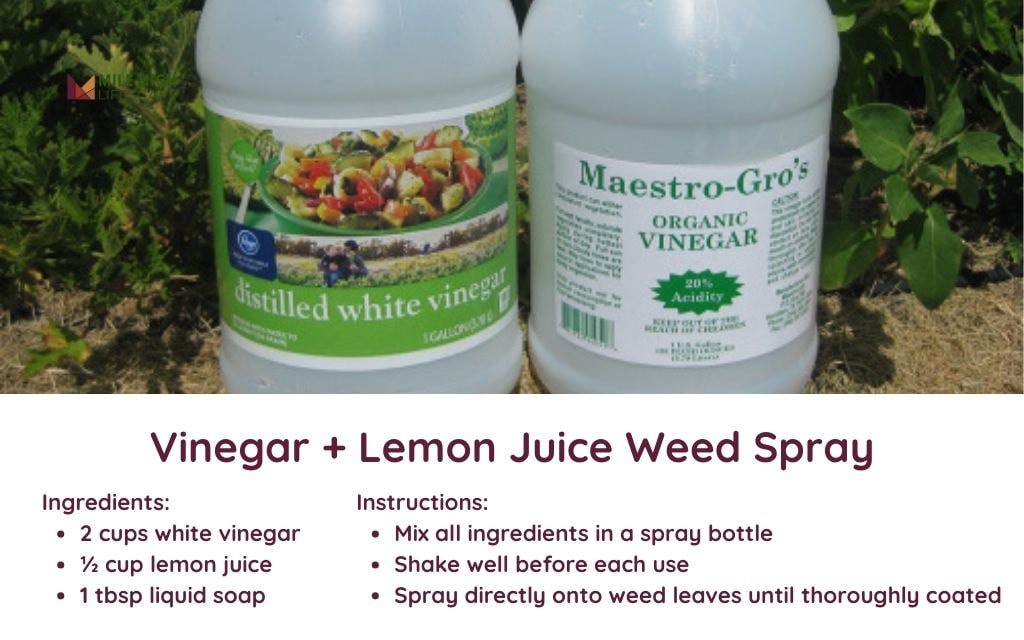
Boiling Salt Water (Best for Sidewalk Cracks)
Ingredients:
- 1 cup salt
- 2 cups boiling water
Instructions:
- Dissolve salt in boiling water
- Pour the hot solution directly over weeds
- Use caution with the hot liquid
Best for: Concrete cracks, brick walkways, and other hardscape areas where precision is difficult. Works particularly well on Denver’s stubborn weeds that thrive in sidewalk expansion joints.
Why it works: The boiling water immediately damages plant tissue, while the salt ensures regrowth is inhibited. The heat also helps the salt penetrate deeper into Denver’s clay soil.
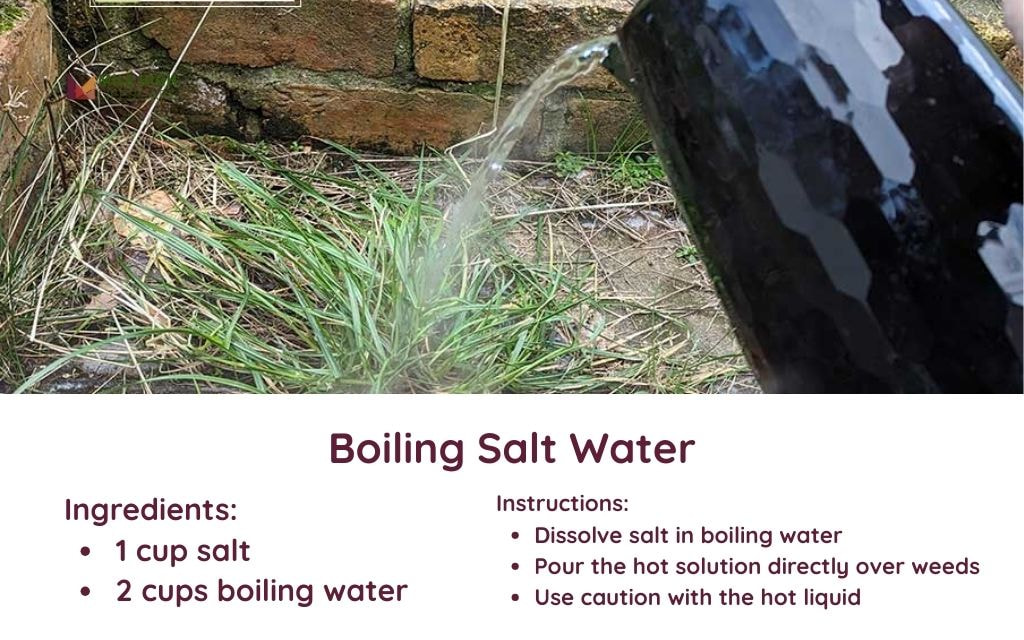
Sun-Scorching Vinegar Spray (Without Salt) (Eco-Friendlier Option)
Ingredients:
- 1 gallon white vinegar
- 1 tbsp dish soap
Instructions:
- Mix vinegar and dish soap in a garden sprayer
- Apply to weeds during the hottest part of the day
- Ensure complete coverage of weed foliage
Best for: Areas near valued plants or in garden beds where soil health is a concern. This solution takes advantage of Denver’s abundant sunshine to maximize effectiveness.
Why it works: The acetic acid in vinegar burns leaves while the soap helps it adhere. When applied during Denver’s intense midday sun, the burning effect is amplified significantly.
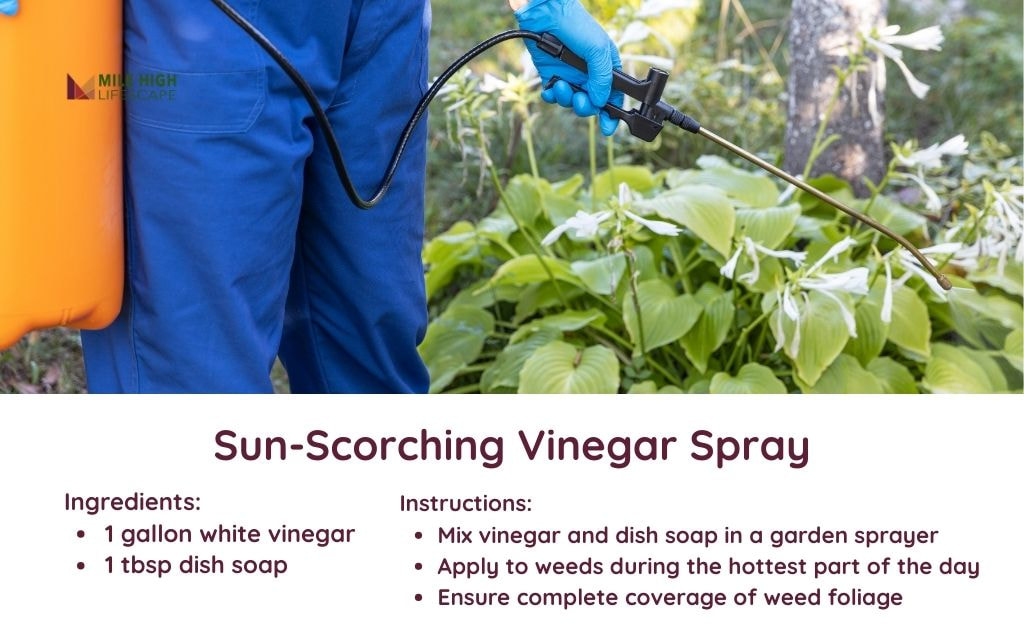
Baking Soda + Vinegar Solution (Mild, Effective for Small Weeds)
Ingredients:
- 2 tbsp baking soda
- 1 cup vinegar
- 1 tbsp liquid dish soap
Instructions:
- Dissolve baking soda in vinegar (it will fizz)
- Once fizzing subsides, add dish soap
- Transfer to spray bottle and apply directly to weed leaves
Best for: Garden edges or small patches of young weeds. Particularly effective on Denver’s alkaline soils where the acidic nature provides additional benefits.
Why it works: The chemical reaction between baking soda and vinegar creates compounds that disrupt weed growth, while being relatively mild on surrounding soil.
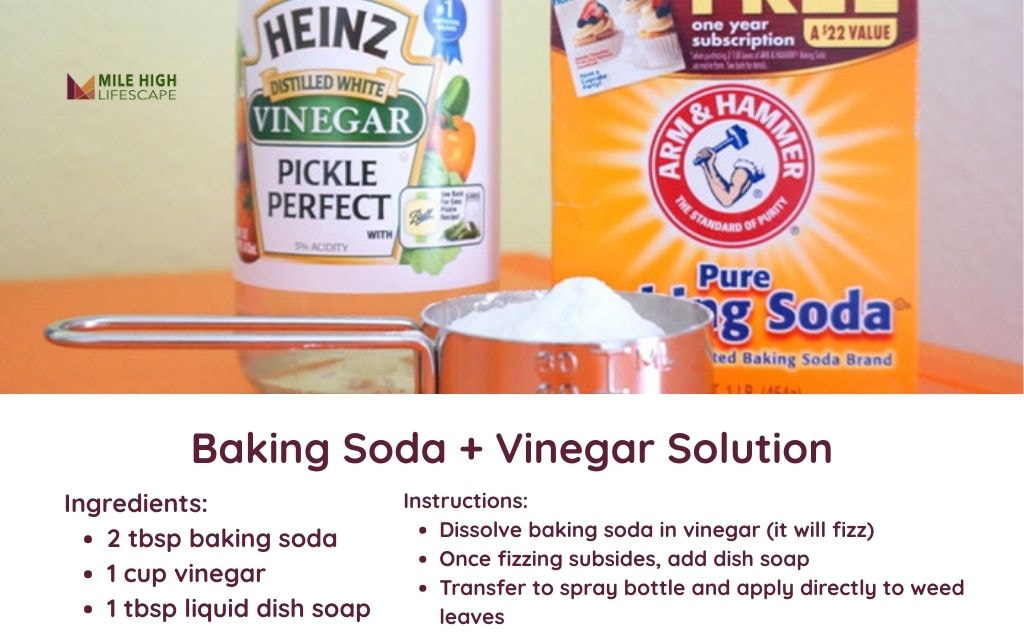
Garlic + Mint Weed Spray (Natural Insect Repellent & Weed Killer)
Ingredients:
- 1 garlic bulb (crushed)
- 1 cup fresh mint leaves (chopped)
- 1 gallon of water
- 1 tbsp liquid dish soap
Instructions:
- Blend garlic and mint with water
- Let the mixture sit for 24 hours, then strain
- Add dish soap and mix gently
- Spray directly onto weeds
Best for: Vegetable gardens and flower beds where you want to control both weeds and insects. Especially valuable in Denver’s vegetable gardens where pest pressure can be high.
Why it works: The natural oils in garlic and mint act as both mild herbicides and insect deterrents, providing multiple benefits in one application.
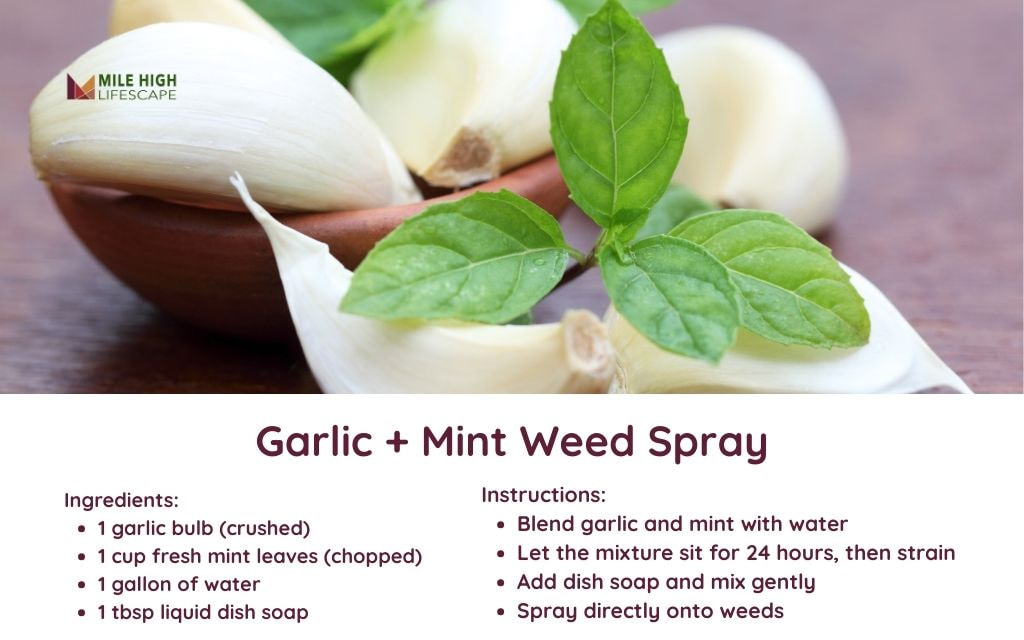
Epsom Salt + Dish Soap + Vinegar Combo (Gentler Option for Flower Beds)
Ingredients:
- 2 tbsp Epsom salt
- 1 cup white vinegar
- 1 tsp dish soap
Instructions:
- Mix ingredients in a spray bottle and shake gently
- Apply solution to weeds early in the morning
- Focus spray on weed leaves, avoiding contact with desirable plants
Best for: Small patches of stubborn weeds in flower beds or garden borders. The magnesium in Epsom salt can actually benefit some flowering plants in Denver’s often magnesium-deficient soils.
Why it works: Epsom salt dehydrates weeds while providing some beneficial minerals to the soil, making this a more balanced approach for garden areas.
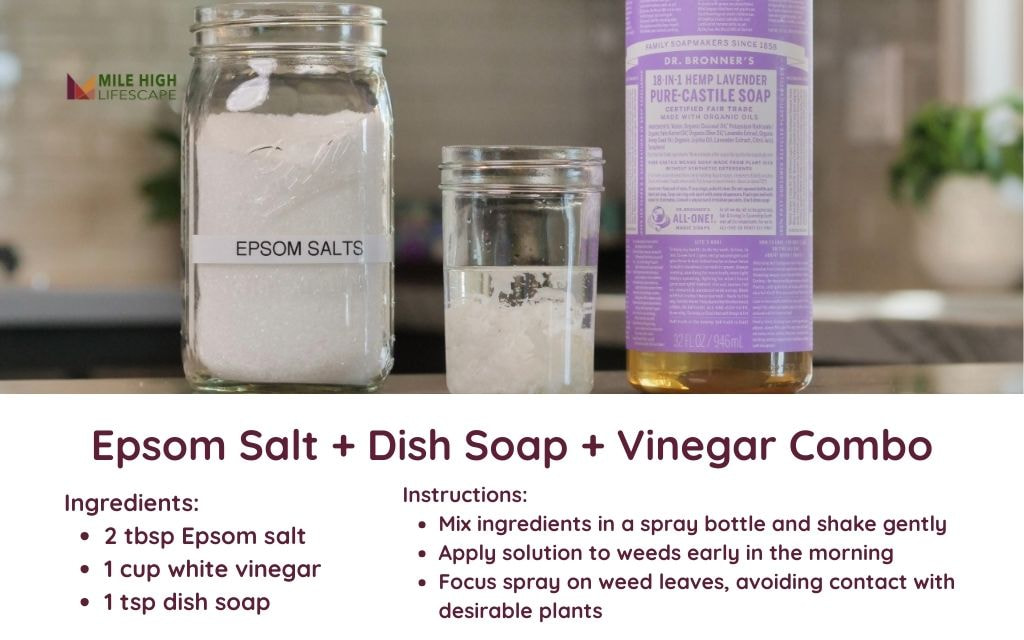
Where & When to Use Homemade Weed Killer in Denver
Denver’s arid climate creates specific conditions that affect homemade weed killer performance:
- Optimal timing: Apply on sunny days with temperatures above 70°F when plants actively grow
- Season considerations: Early spring and late summer provide peak effectiveness
- Application windows: Morning applications allow solutions to dry completely, maximizing impact
Colorado’s low humidity accelerates drying effects, making these solutions particularly effective here. However, our rocky soil harbors deep-rooted perennial weeds like dandelions that may require multiple treatments.
Best application sites include:
- Driveway edges and cracks
- Gravel pathways
- Mulched areas
- Garden bed perimeters
- Walkway joints
Avoid application on:
- Turfgrass areas
- Windy days when spray might drift
- Areas prior to predicted rainfall
- Root zones of trees and shrubs
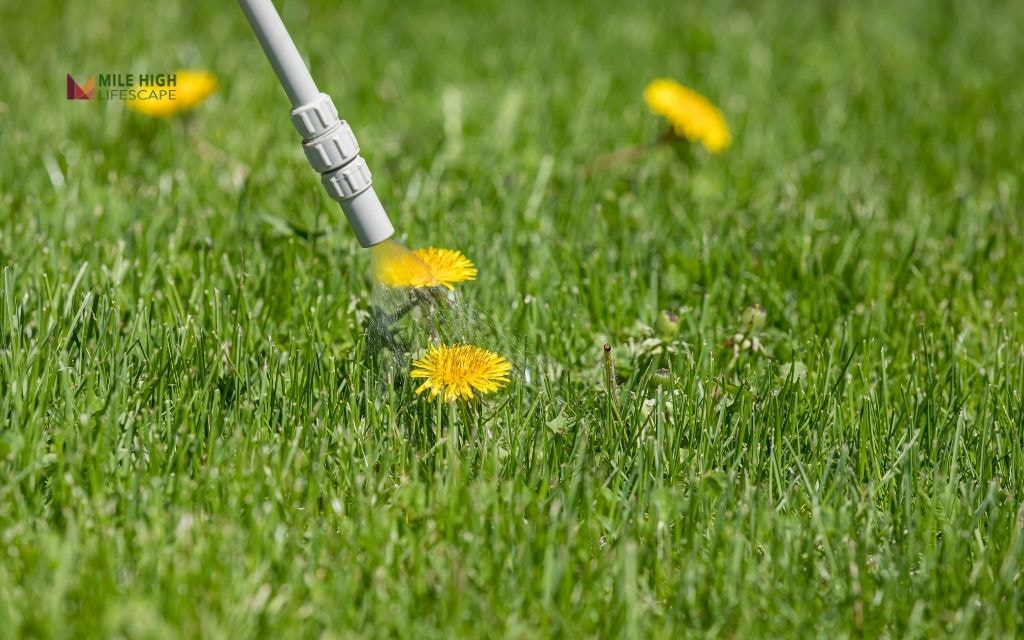
Pet and Child Safety Considerations
One of the main advantages of using homemade weed killer is the reduced exposure to commercial herbicide chemicals.
However, natural doesn’t always mean completely harmless. Here’s how to ensure your weed control methods remain safe for your entire family.
Potential Risks
- Vinegar can cause eye irritation and skin sensitivity
- Salt can be harmful if ingested in large quantities
- Dish soap may cause stomach upset if consumed
- Some essential oils can be toxic to pets, especially cats
- Treated areas may remain slippery until dry
Safety Practices
- Keep pets and children away from treated areas until completely dry (typically 2-4 hours in Denver’s climate)
- Store all solutions out of reach, clearly labeled
- Wear gloves when mixing and applying solutions
- Avoid spraying on windy days to prevent drift
- Wash hands thoroughly after handling ingredients
Extra Precautions for Denver Pet Owners
Follow these additional guidelines to protect your furry friends:
- Wait periods: Keep pets off treated areas for at least 24 hours, especially for salt-based mixtures
- Paw protection: Consider temporary barriers or pet booties if you must walk through recently treated areas
- Water bowls: Remove outdoor pet water dishes before application to prevent contamination
- Common paths: Avoid treating areas where pets frequently travel or rest
- Application timing: Apply early in the day when pets may be indoors to allow maximum drying time
Pros & Cons of Homemade Weed Killers
Before committing to these solutions, it’s important to understand their strengths and limitations compared to commercial alternatives, especially in Denver’s unique gardening environment.
| Factor | Homemade Weed Killer | Commercial Herbicide |
| Cost | Very low ($2-5 per gallon) | Moderate to high ($15-50 per container) |
| Safety | Generally safer with natural ingredients | Potentially toxic, requires careful handling |
| Effectiveness | Good for small annual weeds, multiple applications often needed | Stronger on persistent perennials, longer-lasting |
| Environmental Impact | Low impact, biodegradable (except salt solutions) | Can harm pollinators and soil microbes |
| Selectivity | Non-selective (kills all plants contacted) | Both selective and non-selective options available |
| Persistence | Short-term, often requiring reapplication | Longer-lasting, some with pre-emergent effects |
| Soil Impact | Minimal impact (except salt-based recipes) | Some products may affect soil biology |
| Weather Resistance | Easily washed away by rain | Many formulations are rainproof within hours |
When Homemade Solutions Work Best
In Denver’s climate, homemade weed killer recipes are particularly effective in these scenarios:
- Small-scale weed problems in defined areas
- Annual weeds with shallow root systems
- Hard surfaces like patios and driveways
- During hot, dry periods when plants are already stressed
- When immediate results are needed (many show visible effects within hours)
- Areas where children and pets play frequently
When Commercial Products May Be Necessary
Some Denver weed situations may require commercial solutions:
- Large-scale infestations covering extensive areas
- Deep-rooted perennial weeds like bindweed or thistle
- When selective control is needed (killing weeds but not grass)
- For preventive (pre-emergent) weed control
- When long-term results are required with minimal reapplication
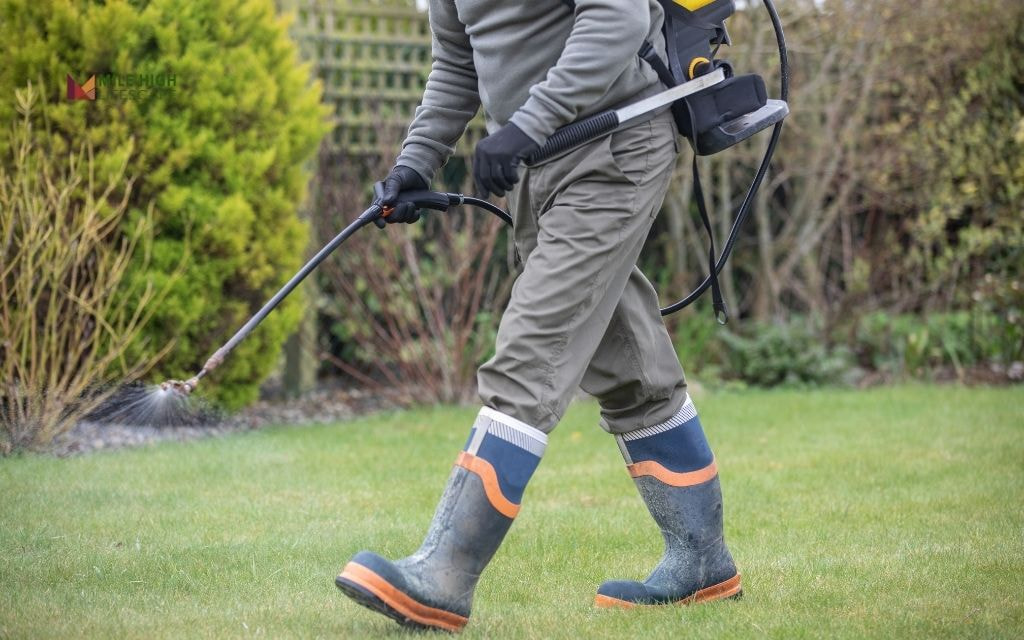
Long-Term Weed Prevention Strategies
Complement your homemade weed killers with these preventive measures for lasting results:
- Apply 2-3 inches of mulch in garden beds to suppress weed germination
- Maintain proper mowing height for your grass type to shade out weed seedlings
- Aerate compacted soil in fall to promote healthy turf that outcompetes weeds
- Hand-pull deep-rooted perennials before seed formation
- Consider corn gluten meal as a natural pre-emergent barrier in spring
- Water deeply but infrequently to encourage deep root growth in desired plants
These integrated approaches reduce the need for reactive weed treatments over time.
When to Call the Professionals
While homemade solutions effectively manage many weed problems, certain situations warrant professional intervention:
- Extensive infestations covering large areas
- Persistent perennial weeds with extensive root systems
- Noxious or legally regulated weed species
- Areas requiring selective weed control within desirable vegetation
- Time constraints that prevent regular DIY treatments
At Mile High Lifescape, we offer eco-conscious weed management programs that complement your homemade solutions. Our targeted approach preserves beneficial insects while providing lasting control against Denver’s most challenging weeds.
Contact us at (303) 877-9091 today!
Conclusion
Homemade weed killer recipes offer Denver homeowners effective, affordable, and environmentally conscious options for managing unwanted plants in their landscapes.
Remember that successful weed management is always a multi-faceted approach. Combining spot treatments using these homemade recipes with proper cultural practices, physical barriers, and prevention strategies will yield the best long-term results in Denver’s challenging climate.
Whether you choose to tackle weeds yourself with these DIY solutions or enlist professional help for more stubborn problems, the goal remains the same: a beautiful, healthy landscape that you can enjoy with peace of mind, knowing you’ve chosen methods that are safer for your family, pets, and the environment.
Frequently Asked Questions (FAQs)
What is the most powerful homemade weed killer?
The vinegar-salt-soap combination delivers the fastest visible results, particularly when using 10% acetic acid vinegar. However, this solution also creates the most significant soil impact.
Will vinegar kill weeds permanently?
Vinegar alone typically kills only the above-ground portion of weeds. Without reaching the root system, many perennial weeds regrow within 1-2 weeks. Multiple applications or combinations with manual removal provides better long-term control.
Will weeds grow back after vinegar treatment?
Annual weeds with shallow roots often die completely from vinegar treatments. Perennial weeds with established root systems frequently regenerate and require repeated applications or alternative control methods.
Will hydrogen peroxide kill weeds?
Yes, 3% hydrogen peroxide can kill young weeds when applied undiluted. It works through oxidation that damages plant tissue, but decomposes quickly into water and oxygen, limiting its residual effectiveness.
How often should I reapply homemade weed killers?
Most homemade solutions require reapplication every 1-2 weeks until weeds stop returning. Weather conditions, weed type, and specific formula all influence effectiveness duration.
